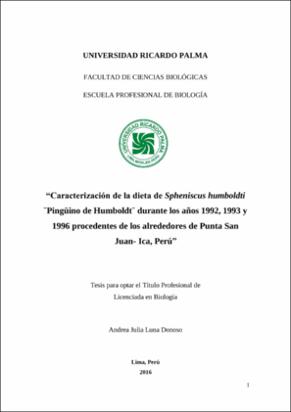Caracterización de la dieta de Spheniscus humboldti ¨Pingüino de Humboldt¨ durante los años 1992, 1993 y 1996 procedentes de los alrededores de Punta San Juan- Ica, Perú
Resumen
El objetivo del presente trabajo fue caracterizar la dieta de Spheniscus humboldti de los alrededores de Punta San Juan, Punta Caballa y Sombrerillo-Ica, Perú durante los años 1992, 1993 y 1996. Se estudiaron 378 estómagos provenientes de captura incidental durante operaciones de pesca artesanal de Seriorella violacea, utilizando redes agalleras. La alimentación de S. humboldti comprendió 27 especies. De acuerdo al coeficiente alimentario numérico, los ítems primarios fueron: Teuthida, Isacia conceptionis, Cheilodactylus variegatus, Sciaena deliciosa, Seriolella violacea, Stromateus stellatus, Eugraulis ringens, Opistonema liberate, Normanichthys crockery, Odonthestes regia, Myctophum nitidulum, Merluccius gayi y Leuroglossus stilbius. La dieta de S. humboldti se considera especialista y con amplitud de dieta. Se observaron diferencias en la dieta de S. humboldti interanual, debido a que en 1992 los ítem presa primarios fueron: Teuthida, C. variegatus, E. ringens, O. liberate, N. crockery, O. regia, M. nitidulum y M. gayi. En el año 1993 los ítem presa primario fueron: Teuthida, I. conceptionis, C. variegatus, S. stellatus, E. ringens, N. crockery, O. regia, M. gayi y L. stilbius. En el año 1996 los ítems primarios fueron: Teuthida, E. ringens, N. crockery y O. regia. Se observaron ligeras diferencias en la dieta de S. humboldti interestacional. Los valores de Shannon-Wiener dan un rango entre 0,07 a 0,47, y el índice de amplitud de nicho de Levin fue de 0,04 a 0,13, por lo tanto, se trata de un depredador especialista. El traslapamiento de la dieta mediante el índice de Bray-Curtis indica que a nivel interestacional por años la diferencia fue de 0,20 Existieron diferencias en la dieta de S. humboldti en relación a los eventos oceanográficos, observándose una diferencia entre 1992 (evento de El Niño), 1996 (evento influenciado por La Niña) y 1993 (año influenciado por El Niño).This work aimed at characterizing the diet of the Spheniscus humboldti from around Punta San Juan, Punta Caballa and Sombrerillo (Ica, Peru) in 1992, 1993 and 1996. Three hundred seventy-eight stomachs from the incidental catch of Seriorella violacea in subsistence fishing operations using gillnets. The diet of the S. humboldti comprised 27 species. Per the numerical food coefficient, the primary items were the following: Teuthida, Isacia conceptionis, Cheilodactylus variegatus, Sciaena deliciosa, Seriolella violacea, Stromateus stellatus, Eugraulis ringens, Opistonema liberate, Normanichthys crockery, Odonthestes regia, Myctophum nitidulum, Merluccius gayi and Leuroglossus stilbius. The S. humboldti is considered a specialist species with dietary breadth. Differences were noted in the diet of the S. humboldti interanual, since, in 1992, the primary prey items were the following: Teuthida, C. variegatus, E. ringens, O. liberate, N. crockery, O. regia, M. nitidulum and M. gayi. In 1993, the primary prey items were Teuthida, I. conceptionis, C. variegatus, S. stellatus, E. ringens, N. crockery, O. regia, M. gayi and L. stilbius. In 1996, the primary prey items were Teuthida, E. ringens, N. crockery and O. regia. Slight differences were noted in the interseasonal diet of the S. humboldti. The Shannon-Wiener index values result in a range between 0,07 and 0,47, and Levin’s niche breadth ratio resulted in 0,04 to 0,13. Therefore, it is a specialized predator. The overlap in the diet, determined through the Bray-Curtis ratio, indicates that, seasonally and by year, the difference was 0,20. There were differences in the diet of the S. humboldti regarding oceanographic events. A difference was observed between 1992 (El Niño event), 1996 (event influenced by La Niña) and 1993 (a year influenced by El Niño).
Colecciones
- Biología [176]


